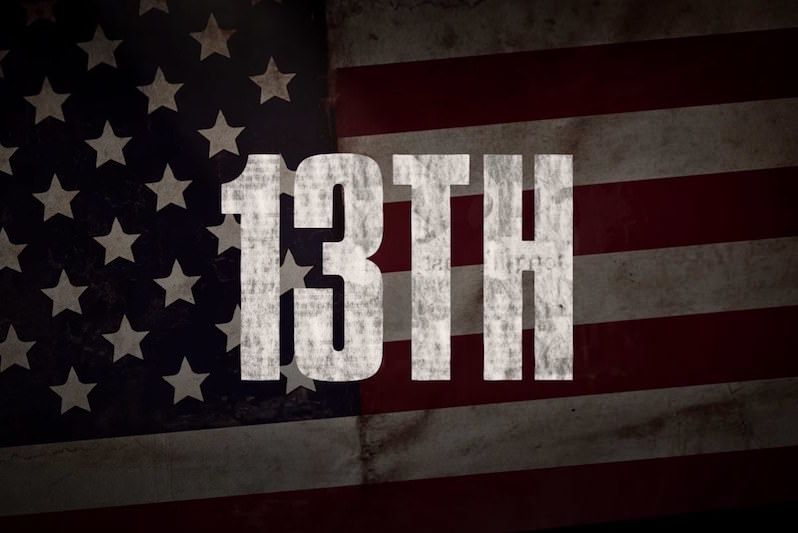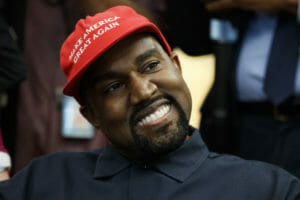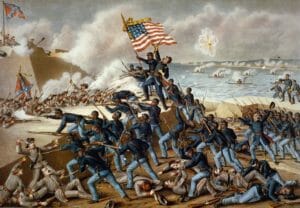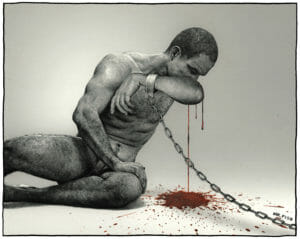‘The Birth of a Nation’ and ‘13th’ School Their Viewers on America’s Racial Legacy
Directors Ava DuVernay and Nate Parker make searingly urgent cases that America’s legacy of slavery and systemic racism is not at all just a relic of the past.
Still image from the trailer for “13th.” (Netflix)
Many Americans are aware that incarceration unduly impacts men of color in the United States. So much so that one of three African-American men can expect to be imprisoned in his lifetime. For Ava DuVernay and many of the activists and intellectuals interviewed in her new documentary, “13th,” mass incarceration is a vestige of slavery that enables whites to view blacks unjustly as perpetrators of crime. This leads to grave injustices such as the deaths of Trayvon Martin and Philando Castile.
DuVernay’s film debuts Friday on Netflix and at the Laemmle film center in Santa Monica and the IFC Center in New York. The film’s title refers to the constitutional amendment that abolished slavery but left the prison door open for blacks who are criminalized in ways that whites are not.
An incisive gut-punch of a film, “13th” chronicles how incarceration is the latest in the ongoing subjugation of blacks since slavery was abolished more than 150 years ago. In her book, “The New Jim Crow: Mass Incarceration in the Age of Colorblindness,” Michelle Alexander says that throughout American history African-Americans have been subjected by “different systems of racial and social control that appear to die, but are reborn in new forms tailored to the needs and constraints of the time.”
For Alexander, one of many eloquent historians and activists interviewed by DuVernay, there is a direct progression from slavery and Jim Crow to the “war on drugs” in the 1970s and today’s skyrocketing levels of incarceration for African-Americans. Such systems of social control all but guarantee the subordination of people of color, making it no leap of logic to see prisons as 21st-century plantations.
DuVernay and co-writer Spencer Averick cover 150 years in 100 minutes, from the ratification of the 13th Amendment in 1865 to the recent lethal encounters between black men and police. In interviews with activists and intellectuals such as Jelani Cobb, Angela Davis and Van Jones, as well as political figures including Newt Gingrich, Grover Norquist and Charles Rangel, the filmmakers gather evidence to support Alexander’s thesis.
It surprised me, as it might surprise most moviegoers, that Gingrich and Alexander agree on some points.
What astounded me even more was learning about the existence of the American Legislative Exchange Council (ALEC), a group that drafts bills advancing a racist agenda, e.g. the “Stand Your Ground” Florida law that helped acquit George Zimmerman of the murder of Trayvon Martin. ALEC promotes mandatory minimum sentences, thereby boosting the business of the for-profit Corrections Corporation of America (ALEC drafts legislation for mandatory minimum sentencing, which means prisoners serve extremely long sentences, which means CCA jails have long-term tenants). Because of the cooperation, some might say collusion, between these organizations, black inmates are a cash crop.
DuVernay, whose 2012 feature “Middle of Nowhere” drove home how incarceration affects the spouses and communities of the imprisoned, is both more measured and more furious in “13th.” Her signature shot — showing subjects both in full face and in profile — wields considerable power here, insisting that the audience see and hear people in whole, their red-hot rage at injustice as well as their cool reason.
It’s hard to describe the cumulative effect of this film that include a montage of family videos recording the deaths of Philando Castile, Eric Garner and Tamir Rice. At once devastating, infuriating and bracing, “13th” is a landmark documentary that mourns the martyrs and provides a précis of how to make America truly just.
●
DuVernay’s “13th” condemns D.W. Griffith’s “The Birth of a Nation” (1915) for propagating the image of rapacious black men stalking white women. Nate Parker’s “The Birth of a Nation,” an involving biopic of slave/revolutionary Nat Turner, co-opts the title of Griffith’s film and effectively argues that it was rapacious white slaveholders who stalked black women.
Parker co-wrote and directed “The Birth of a Nation,” and he stars as Turner. The film powerfully chronicles its subject’s youth and his growing consciousness that he is a leader. The first scene features a vision of young Turner’s African ancestors who mark him as their chieftain. When Turner awakens, his mother assures him that it was only a dream.
On a plantation in Virginia, Turner picks cotton but he also plays with the master’s son. Upon learning that Turner can read, the master’s wife gives him a Bible. As an adult, he is a soul-stirring preacher. Turner’s visits to other plantations, where slaves are shackled, force-fed and beaten, show him how singular his slave experience has been. And how his religious faith may be at odds with his awakening political awareness. (The film would better be titled “The Birth of a Consciousness.”)
Parker is a charismatic actor — not to mention an excellent director of actors — and for its first two-thirds, “The Birth of a Nation” captivates with its subtle characterizations and storytelling.
As the bond between Turner and his wife (Aja Naomi King) strengthens, that between Turner and his master (Armie Hammer) grows increasingly tenuous. Initially happy to pray with slaves at nearby plantations, Nat slowly recognizes he is being used as an instrument to preach peace — in other words, to quell slave uprisings — while his master keeps payments for Turner’s preaching services from the plantation owners.
Subtlety is dispensed with in the film’s final third, which echoes “Braveheart,” with its hero who gives his all fighting for the freedom of his people. In spite of this, “The Birth of a Nation” is a stirring piece of revisionist history that marks an auspicious directorial debut.
Postscript: Some are boycotting “The Birth of a Nation” because of a past rape accusation against Parker, of which he was ultimately acquitted, although the details of that acquittal and of the case itself are still a subject of ongoing public debate. I don’t want to litigate this specific case, but in general I think that if we say good riddance to art by misogynist, violent and otherwise morally questionable men, then there go Woody Allen, William Burroughs, Caravaggio, Charlie Chaplin, Norman Mailer, Pablo Picasso and Roman Polanski.
Independent journalism is under threat and overshadowed by heavily funded mainstream media.
You can help level the playing field. Become a member.
Your tax-deductible contribution keeps us digging beneath the headlines to give you thought-provoking, investigative reporting and analysis that unearths what's really happening- without compromise.
Give today to support our courageous, independent journalists.







You need to be a supporter to comment.
There are currently no responses to this article.
Be the first to respond.